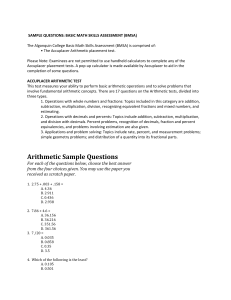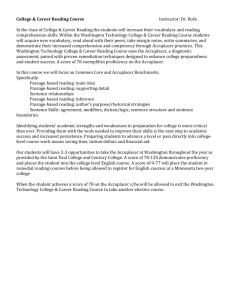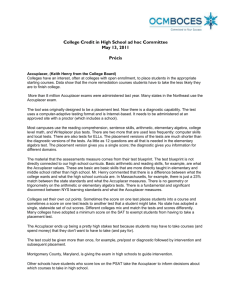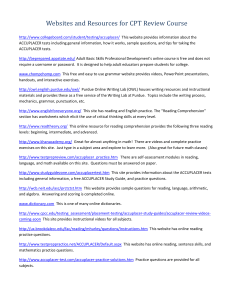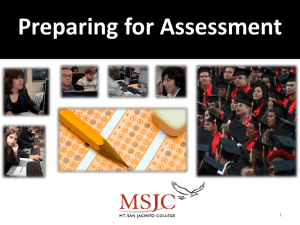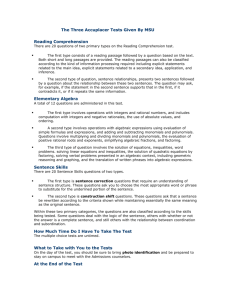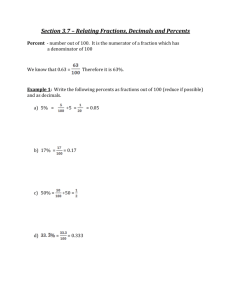Preparation Guidelines for the Accuplacer Arithmetic Test
advertisement
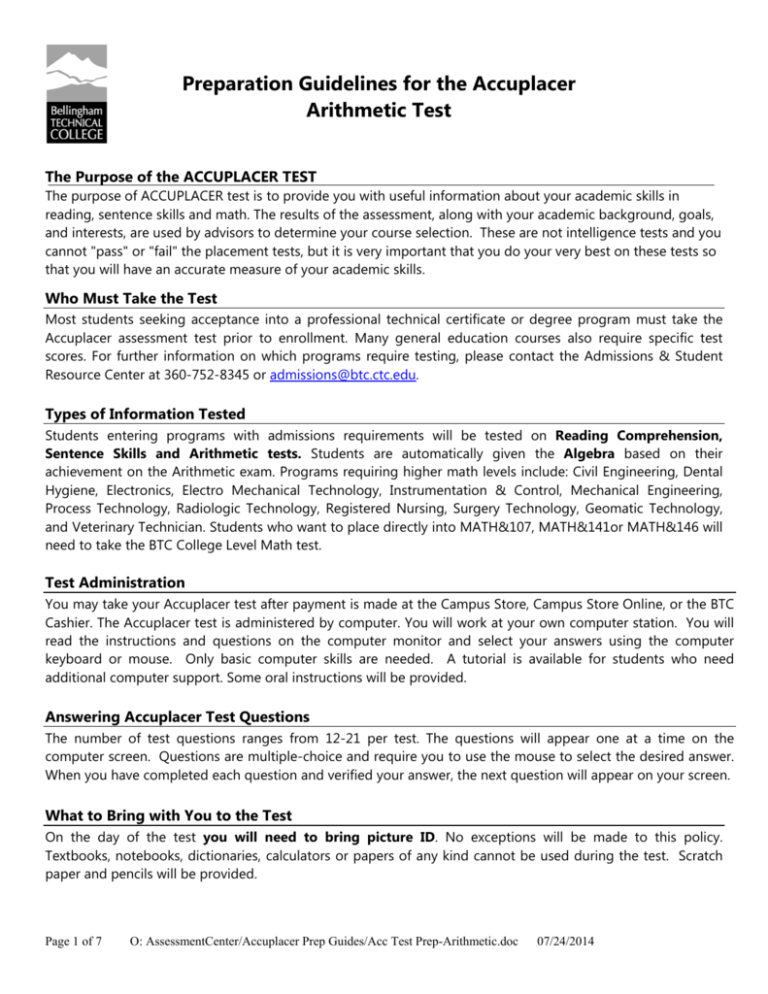
Preparation Guidelines for the Accuplacer Arithmetic Test The Purpose of the ACCUPLACER TEST The purpose of ACCUPLACER test is to provide you with useful information about your academic skills in reading, sentence skills and math. The results of the assessment, along with your academic background, goals, and interests, are used by advisors to determine your course selection. These are not intelligence tests and you cannot "pass" or "fail" the placement tests, but it is very important that you do your very best on these tests so that you will have an accurate measure of your academic skills. Who Must Take the Test Most students seeking acceptance into a professional technical certificate or degree program must take the Accuplacer assessment test prior to enrollment. Many general education courses also require specific test scores. For further information on which programs require testing, please contact the Admissions & Student Resource Center at 360-752-8345 or admissions@btc.ctc.edu. Types of Information Tested Students entering programs with admissions requirements will be tested on Reading Comprehension, Sentence Skills and Arithmetic tests. Students are automatically given the Algebra based on their achievement on the Arithmetic exam. Programs requiring higher math levels include: Civil Engineering, Dental Hygiene, Electronics, Electro Mechanical Technology, Instrumentation & Control, Mechanical Engineering, Process Technology, Radiologic Technology, Registered Nursing, Surgery Technology, Geomatic Technology, and Veterinary Technician. Students who want to place directly into MATH&107, MATH&141or MATH&146 will need to take the BTC College Level Math test. Test Administration You may take your Accuplacer test after payment is made at the Campus Store, Campus Store Online, or the BTC Cashier. The Accuplacer test is administered by computer. You will work at your own computer station. You will read the instructions and questions on the computer monitor and select your answers using the computer keyboard or mouse. Only basic computer skills are needed. A tutorial is available for students who need additional computer support. Some oral instructions will be provided. Answering Accuplacer Test Questions The number of test questions ranges from 12-21 per test. The questions will appear one at a time on the computer screen. Questions are multiple-choice and require you to use the mouse to select the desired answer. When you have completed each question and verified your answer, the next question will appear on your screen. What to Bring with You to the Test On the day of the test you will need to bring picture ID. No exceptions will be made to this policy. Textbooks, notebooks, dictionaries, calculators or papers of any kind cannot be used during the test. Scratch paper and pencils will be provided. Page 1 of 7 O: AssessmentCenter/Accuplacer Prep Guides/Acc Test Prep-Arithmetic.doc 07/24/2014 Order of the Tests The Accuplacer tests are presented in the following order: Reading Comprehension, Sentence Skills, Arithmetic and, if applicable, Elementary Algebra. If you are retaking an Accuplacer test, be sure to specify which test(s) you need to retake when you check in with the proctor. The test administrator will set up the computer so that it presents only the test(s) that you need to retake. Score Reporting When you have completed all the tests, the test administrator will print out a report of your scores for you. You may then meet with an advisor. He or she will explain the results and make recommendations. Testing Fee The Accuplacer test fee is $21 for one full battery of exams plus one re-test of any desired exams in the battery of tests within one year’s time. Before you can be placed on the waiting list for a degree/certificate program, you must submit a Degree/Certificate Program Admissions Application in addition to passing the Accuplacer test. Certain programs have additional requirements. Special Accommodations for Students with Disabilities: If you have a documented disability that requires testing accommodations, such as use of a calculator, reader, and/or private testing room, please make an intake appointment with the Accessibility Resources Office at (360) 752-8576 or (360) 752-8450. After your initial intake and review of your documentation by AR, you will be contacted and your Accuplacer appointment will be made at that time. NOTE: Please allow 2-4 weeks after documentation review for testing. If you have any questions regarding Accessibility Resources, please refer to our website at www.btc.ctc.edu/AR Accuplacer Website For more information about the test (how it works, sample questions, etc.) go to www.collegeboard.com/student/testing/accuplacer/index.html. Sample questions and some hints about the assessment are included at this site. Remember that your questions will differ from these because the computer will select questions that challenge you without making the test too difficult. Other Resources Bellingham Technical College recommends www.khanacademy.com, a free math tutorial resource. Also, an online version of this study guide appears at www.btc.ctc.edu/Assessment and the Bellingham Technical College Library and Basic Academic Skills department both have resources listed at the end of this study guide. Page 2 of 7 O: AssessmentCenter/Accuplacer Prep Guides/Acc Test Prep-Arithmetic.doc 07/24/2014 Arithmetic Competency in mathematics can be established by taking the arithmetic test or by previous college cousework and is required for all programs that require admission (except Phlebotomy). The arithmetic test also determines student placement into ABE050, MATH090 and BUS150 courses. The Arithmetic section of the Accuplacer test has 17 questions and tests you in the following areas: WHOLE NUMBERS Find an average of 4 numbers. Multiply two 3-digit numbers. Estimate by rounding. What number does the answer end with? Eliminate options. Solve problems involving: o Ratio and proportion (scale drawing, recipe) o Distance/speed/time o Cost per square foot of a rectangular floor (know the formula for the area of a rectangle) o Graphs (bar and circle) o Cost per unit FRACTIONS Change a fraction to an equivalent fraction (multiply by 1). Give a simplified fraction to represent parts of a whole. What fraction represents: 56 out of 96 passed the test? Find the greatest or least fraction among four given fractions. Know that 4/5 of a number means 4 times 1/5 of the number or 1/5 of 4 times the number. Add two fractions whose common denominator is already the denominator of one of the fractions (e.g., 2/5 + 3/15). Subtract fractions Know that “What fraction added to __ gives ___ ?” means to subtract. Perform 2-step problems involving addition and subtraction of fractions with unlike denominators (e.g. 2/3 +1/8 -1/6). Subtract mixed numbers (with or without having to borrow). Rewrite a mixed number as a whole number and a fraction (2 2/3 = 1 + N/6). Multiply a whole number by a fraction or a mixed number. Multiply two mixed numbers. Divide a whole number by a fraction. Solve word problems involving o Adding two fractions and then subtracting from 1 Page 3 of 7 O: AssessmentCenter/Accuplacer Prep Guides/Acc Test Prep-Arithmetic.doc 07/24/2014 o Finding the result of increasing a mixed number measurement by a mixed number factor (e.g. Given 3½ ft., find the length that is 1¼ times as long.). DECIMALS Write the expanded form as a decimal (3 + 4/100 + 7/1000 = 3.047). Rewrite a decimal as a mixed number. Add three decimals where one is a whole number, one goes to the tenths’ place and one goes to the hundredths’ place (23 + 0.8 + 0.05) Add a fraction whose denominator is a power of ten to a decimal. Subtract decimals. Multiply a decimal by a power of ten. Multiply two decimals. Locate the answer “between” two given whole numbers. Find the square of a decimal. Estimate the product of two decimals without doing the multiplication (e.g. 16.2038 x 99.951; possible answers: 16, 160, 1600, 16000). Divide a decimal by a whole number. Divide a whole number by a decimal. Divide a decimal by a decimal. Estimate the quotient of two decimals without doing the division. PERCENTS The word “percent” is used more than the symbol “%”. Write a percent as a decimal. Write a percent as a fraction. Know that “__ percent of __” means to multiply. Know that “twice as big” means 200%, “three times as big” means 300%, etc. “Reverse percents” (If 60 is 25% of a number, then the number is what percent of 60?) Solve all three types of percent problems: o Find a percentage of a number (Find 20% of 65) o Find the number when a percentage is given (34 is 5% of what number?) o Find the percent (8 is what percent of 12?) Know that “N% more” is equivalent to (100 + N)% Word problems involving: o Tip on a restaurant bill (estimate) o Percent raise in salary o Minutes as part of an hour o Successive discounts o Paying N% more than previously. MISCELLANEOUS Use the fact that multiplication and division are inverse operations (e.g. If x/10 = 0.79, then x = 10 x 0.79). Know that A/B means “A divided by B”. Know the meaning of the square root symbol. HELPFUL HINTS Knowing the meaning of these math symbols may help you. Page 4 of 7 O: AssessmentCenter/Accuplacer Prep Guides/Acc Test Prep-Arithmetic.doc 07/24/2014 ( )2 ( )3 ARITHMETIC EXAMPLES The following problems are similar to those you may find on the arithmetic section of the Accuplacer test. The answers to these problems appear in the back of this handout. 1) 12532 - 53 = 2) 571 x32 3) Greatest common factor of 16 & 24 is 4). 1 5 = + 2 6 5). 2 6 = x 3 7 7). 3782 = 5 8). Write as a decimal 4 6). 10 - 9). 5 = 8 3 1 8 2 14 100 10). .42 x .0006 = 11). 8.4 - .07 = 12). 126 is _____% of 2100 13). 56 is 40% of of _____ 14). Express .001 as a fraction 15). .16 = 16). Three people who work full time are to work together on a project, but their total time on the project is to be equivalent to that of only one person working full time. If one of the people is budgeted for 1/2 of his time to the project and a second person for 1/3 of her time, what part of the third worker’s time should be budgeted to this project? Page 5 of 7 O: AssessmentCenter/Accuplacer Prep Guides/Acc Test Prep-Arithmetic.doc 07/24/2014 RESOURCES FOR MATH REVIEW Students may choose from a variety of resources that can assist in refreshing basic academic skills. Depending on your time schedule, learning style, or the level of assistance needed, choose the option that will work for you. You may also choose to meet with a counselor or advisor to obtain their recommendation. 1. INDEPENDENT STUDY LIBRARY Listed are some of the resources located in our library. Some of these are available for checkout and some are for use in the LIBRARY. Our library is open to the community. You do not have to be a student at BTC to use the resources. The LIBRARY is located in A Building and is open during the following days and times. Monday to Thursday Friday Saturday Sunday 7:00 a.m. to 7:00 p.m. 7:00 a.m. to 4:00 p.m. 12:00 p.m. to 3:00 p.m. Closed The LIBRARY has a variety of materials available for basic skill review. Those listed below are a small sampling. Please feel free to ask our LIBRARY staff for assistance. ARITHMETIC MATERIALS SPECTRUM math workbooks Basic Math Review (also available in BTC Bookstore for $3.00 + tax) A math tutorial is also available on the computer. It provides instruction and practice for a variety of math applications. Assorted GED preparation materials, covering reading and math 2. SELF-PACED - OPEN ENROLLMENT Basic Academic Skills Adult Basic Education classes are taught in the Learning Center in an individualized and small group study atmosphere. Basic Academic Skills is open from 8:00 a.m. to 11:00 a.m. and 12:00 p.m. to 3:00 p.m. as well as evening hours. Please check our quarterly schedule for current registration information or contact the Admissions Office for assistance from our advising staff. Running Start students are not eligible to use BAS and should seek assistance at their high school. 3. STRUCTURED CLASSES BASIC ACADEMIC SKILLS REFRESHER COURSES Math 090 – Pre -Algebra at BTC. In fact, passing this course counts for passing the Arithmetic portion of Page 6 of 7 O: AssessmentCenter/Accuplacer Prep Guides/Acc Test Prep-Arithmetic.doc 07/24/2014 the Accuplacer test. This is strongly recommended for those with little or no previous course work in arithmetic or for whom it has been a long time. Pre-requisite: Accuplacer Arithmetic score of 38 or higher. ARITHMETIC ANSWER KEY 1. 2. 3. 12, 479 18, 272 8 10. .000252 4. 1 1 3 4 7 11. 12. 13. 8.33 6% 140 14. 1 1000 5. 9. 8 5 3 - =9 8 8 8 6. 9 7. 8. 756.4 4.14 16. 1 1 3 2 5 + = + = (Total time of persons 1 and 2) 2 3 6 6 6 15. 1 (Total of three workers time) - 3 4 .4 5 1 == (Time budgeted for person 3) 6 6 Mission Statement: BTC’s mission is to deliver superior professional technical education for today’s needs and tomorrow’s opportunities. Bellingham Technical College does not discriminate against any person on the basis of race, color, national origin, disability, sex, genetic information, or age in admission, treatment, or participation in its programs, services and activities, or in employment. All Inquiries regarding compliance with access, equal opportunity and/or grievance procedures should be directed to the Associate Director of Human Resources, Bellingham Technical College, 3028 Lindbergh Avenue, Bellingham, WA 98225, or call (360) 752-8354 or 752-8515/TTY. EQUAL EMPLOYMENT OPPORTUNITY COLLEGE Page 7 of 7 O: AssessmentCenter/Accuplacer Prep Guides/Acc Test Prep-Arithmetic.doc 07/24/2014
